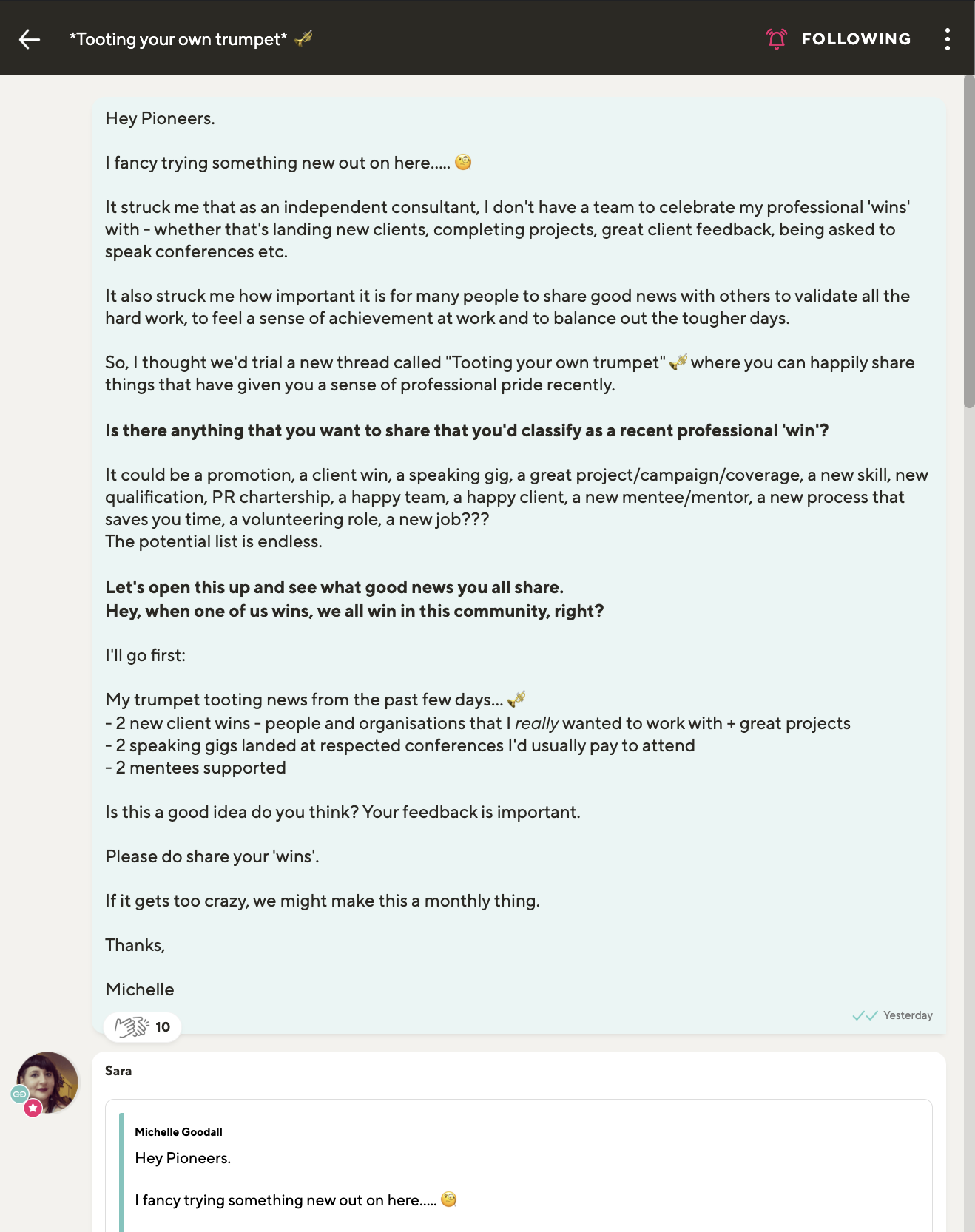What are rituals in community building and why are they so important?
What are rituals in communities?
Rituals in online communities are recurring or sequenced activities, traditions or behaviours that hold symbolism and meaning for community members.
Rituals play an important role in community building and can contribute to a sense of comfort, belonging, identity, and cohesion within groups. They can also help establish and reinforce a community’s values, and encourage participation and trust among community members.
And at their simplest level, rituals can improve engagement within a community.
But rituals need to be thought through and planned with good intentions. Some community rituals can fall flat, be ill judged, reinforce a feeling of ‘cultish’ behaviours from the outside and can also exclude people.
Let’s take a look at community rituals in a bit more detail.
Example community rituals
Here’s an example from a community I belong to. I’m in a local community choir in East London. If you are too, you’ll know just how powerful it is coming together collectively to sing, and how great it can make you feel.
Studies of communal singing and dancing rituals by social anthropologists such as Professor Dunbar show increased endorphin production leading to pleasurable feelings and a decrease in anxiety.
A choir is also a great example of how a community is much greater than the sum of its parts.
We meet up in our practice venues and the places where we perform. We also engage in virtual spaces, including WhatsApp Groups. During the pandemic, we sang together through periods of isolation and met virtually on Zoom (mics off) and fun meet up spaces like Remo. The choir community was a genuine life saver for many of us.
We have a number of rituals designed to be as inclusive as possible, for example:
- Greeting new members in a circle and repeating our names to help them get to know us quickly
- Energising warm up exercises and songs that make us smile, relax into the sessions and blend our voices
- Celebrating birthdays and other group milestones with funny, relatable gifs
In digital/virtual communities there are some simple rituals that you can build into your plans
For example:
Regular welcome messages to new members
Community milestones and member achievements
Member challenges
Share or ‘pitch’ days when members can freely share/promote within community guidelines
Member spotlights or shoutouts, e.g. member of the month
A regular weekly or monthly topic for discussion
An example of a community ritual in a professional community. As host of this community, I’m testing whether this process of sharing personal and professional wins could become a regular ritual.
Source: Guild - Comms & PR Pioneers Community
Why rituals are important in the context of online communities
Here are some key reasons why building rituals into your community is helpful:
Building a sense of belonging
Rituals create shared experiences among community members. Participating helps individuals feel connected to the community and each other.Establishing community identity
Rituals contribute to a community's identity. They can reinforce what the community values and stands for, helping members define and understand their collective identity.Strengthening community culture, connection and trust
Rituals can contribute to community culture. They can help establish norms, traditions, and shared behaviours that form the unique character of the community. Rituals can mark positive and important milestones for the community, such as anniversaries, achievements, or significant events. Celebrating these moments together reinforces a sense of accomplishment and shared success. Shared experiences help build trust and rapport within the community.Encouraging community participation and engagement
Rituals can create opportunities for easy participation. Active vs. passive community engagement helps build a sense of ownership and investment in the community. Rituals provide reasons for members to return, participate, and continue contributing to the community long term.Facilitating communication and interaction between members
Rituals provide a simple, low friction and structured way for community members to interact and communicate. Rituals such as regular meetups, challenges or themed discussions create regular touchpoints for engagement.Providing stability and predictability
Rituals create a sense of stability and predictability within the community. Regularly scheduled activities help members know what to expect and can provide a routine that may be more important to some members than others.Onboarding and integration of new members
Rituals can serve as onboarding mechanisms for new members, and help them integrate more quickly. They provide an opportunity for newcomers to understand community traditions, values, and expectations
Are community rituals risky?
Rituals are important, but it’s important to note criticism levelled at building rituals and encouraging or even rewarding specific behaviours in a community.
Some rituals can reinforce a sense of exclusion
Some rituals can be non-inclusive - perhaps inadvertently.
For example, there may be a ‘cost’ to an individual or some form of hidden or explicit knowledge/skill required around a specific ritual. This might make a ritual non-inclusive to some members.
A good analogy is that in the investment banking sector, wearing the wrong colour shoes to a job interview (brown and not black) can single you out someone who doesn’t understand embedded behavioural codes within the profession.
The equivalent in a community would be not giving an onboarding member the right support, cues or opportunities to engage with established rituals and expecting them to just ‘get’ how to join in.
Some rituals can create reliance and stifle creativity and free flowing discussion and debate
Introducing rituals too early or using them too frequently in your community can set members expectations. Use rituals too frequently and it may feel that the community manager/host is the only person posting threads/discussions. Member-led engagement could be be stifled, and you have a community that only engages when there’s a ritual.
Of course, this could be a part of your community design, but most communities are richer and valued more when unprompted member engagement is the norm.
Some rituals can feel a bit weird or even ‘cultish’
Have you ever been to an event where you’ve been asked to collectively shout something by the M.C as an energiser to get the audience going?
I have. Even as an extrovert, these types of rituals can make me feel uncomfortable, especially if I don’t know other attendees well.
In communities of purpose, a ritual (challenge, celebration, chant etc) led by a community host can be important for bonding and energising people into collective action, but this doesn’t naturally translate well to all communities.
A definition of a cult is:
”a relatively small group which is typically led by a charismatic and self-appointed leader, who tightly controls its members, requiring unwavering devotion to a set of beliefs and practices which are considered deviant (outside the norms of society).”
Creating community rituals that feel special and unique, fun and rewarding for the majority of members can also make some members feel manipulated. Do consider getting feedback or testing rituals that feel a little ‘devotional’ with a representative sample of members.
In summary, rituals play a pivotal role in community building by fostering a sense of belonging, defining identity, and creating shared experiences among members. They contribute to the development of an engaged, vibrant and resilient online community.
But do create rituals that are designed to be inclusive by default, and test and learn to see what works best for your community.
Thank me / Hire me
Are these articles helpful to you?
Please do contact me if you’d like to discuss any aspect of community building or if you want support with your community strategy. I’m happy to discuss both small and large projects.
Further reading
I’ve created a community glossary and I also explain key concepts in community strategy, community building and community management.
Here are some connected articles that you may find helpful:
What is the ‘Expansion Effect’ in community strategy?
The ‘Third Place’ - what is it and how can we apply learnings to community building?
Is it possible to create a successful consumer brand without community?
Transactional analysis in community
Why Community is a Business Moat
What is a Community Qualified Lead (CQL)? And how does it differ from a MQL or PQL?
What is Community Everywhere / what are Community Ecosystems?
What is Community Led Growth - is it the same as Community Based Marketing (CBM)?
What is Community Market Fit?
What is Minimal Viable Community (MVC)?
What are rituals in community building and why are they so important?
What are the 5 Ps and 1 C of community?
What is Broken Windows Theory and does it apply to Community Management?
Why we need to ban the term ‘lurkers’ in community strategy
What is Community Manager Appreciation Day (CMAD)?
Book a Free Consultation
Want help or support with your community strategy or community building? I’m ready and waiting to hear from you. Book an introductory call to speak to me about your challenges and questions you might have.


